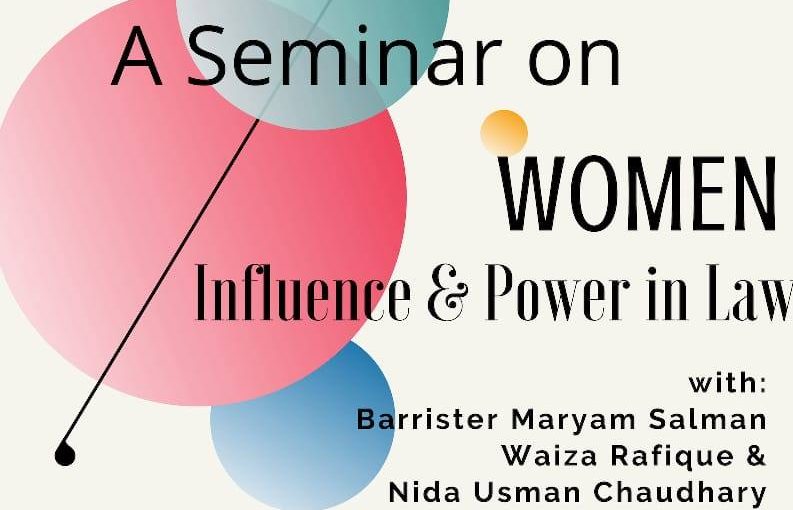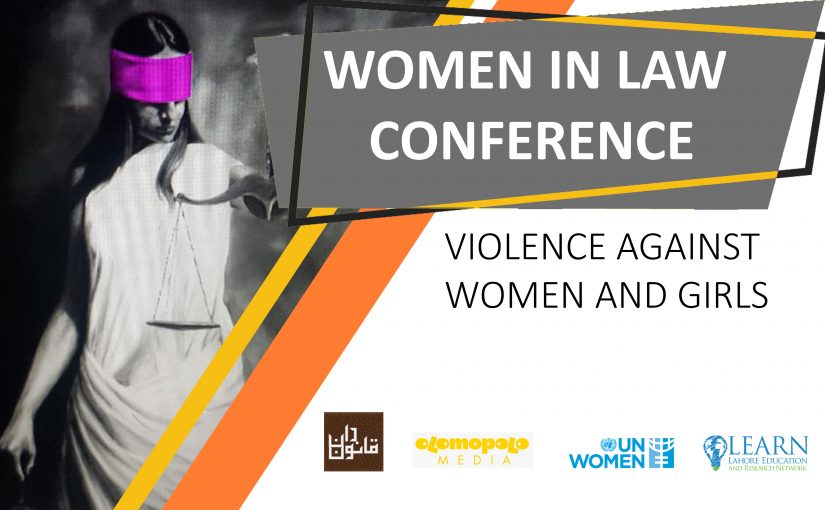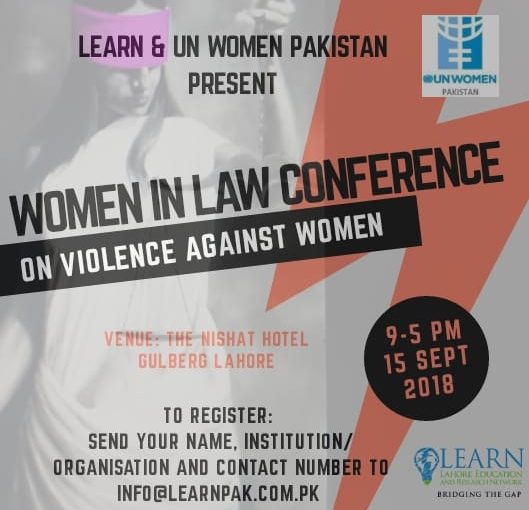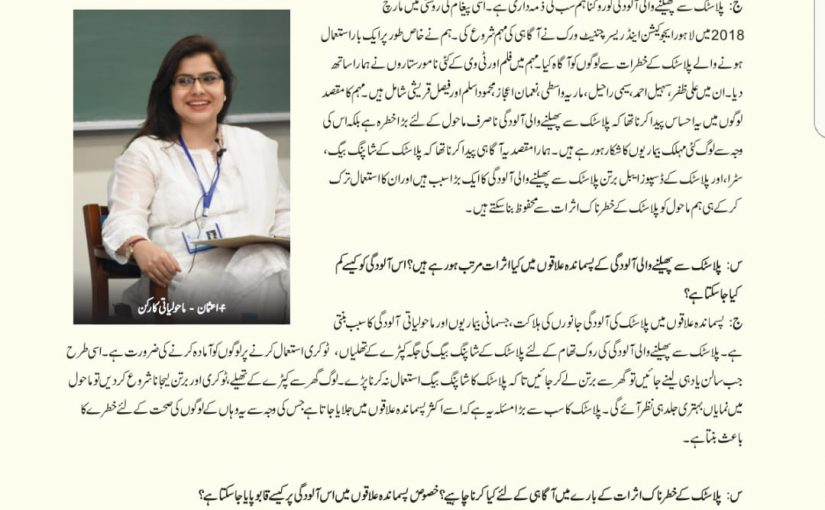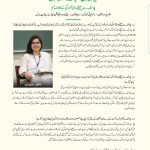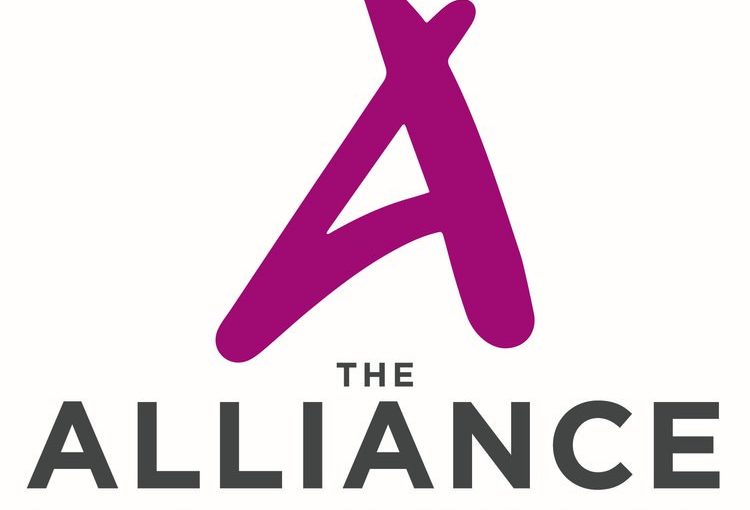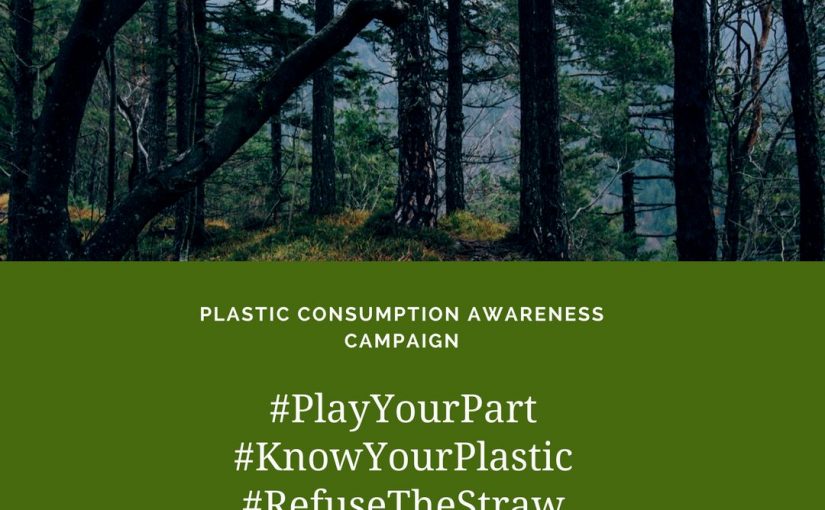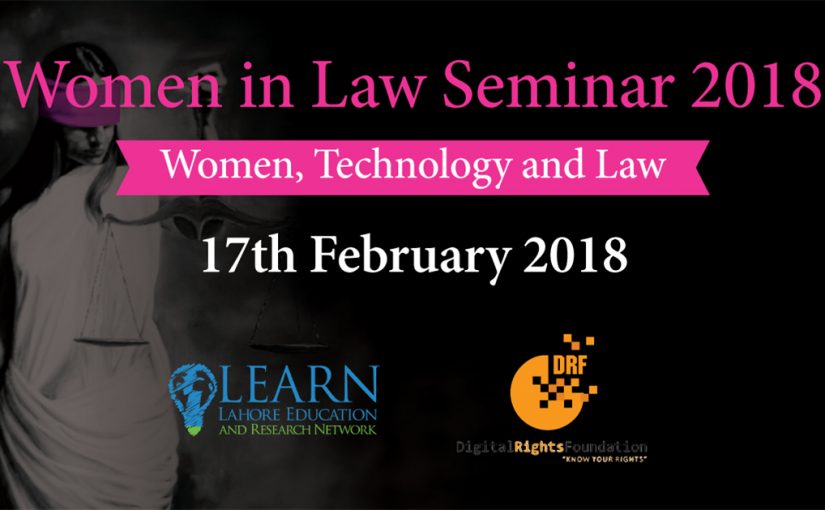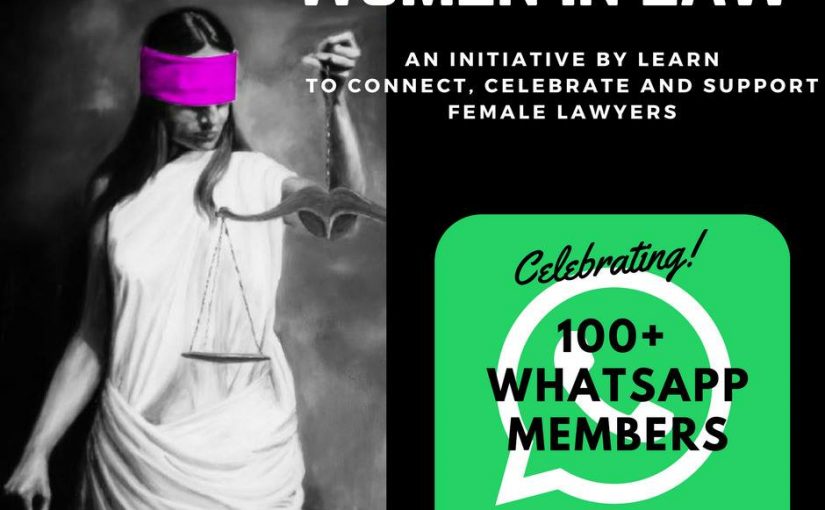Seminar on Women: Influence and Power in Law
HERSELF and LEARN Pakistan along with PEACEFUL PAKISTAN bring to you an insightful seminar on Women INFLUENCE & POWER IN LAW. #WIPL
FREE ENTRY, REGISTER NOW: https://goo.gl/forms/2x1HW60GjA5FX8rr2
Experts from the field of LAW in diverse fields will be training and answering your questions on where to go when you need help with a certain law.
Among the discussion topics are:
– Women Harassment at Workplace
– Cyber security and Prevention of electronic Crimes
– Law for businesses
Meet us on Friday 9th Nov at 3:00 pm onwards at this event as we discuss women, power and influence in law through various legal aspects related to women entrepreneurs
Reclaim Your Space – 4th Dialogue in the Women in Law Series
The 4th Dialogue in the our celebrated ‘women in law dialogue series’ takes place at University College Lahore this November 2018.
4th Women in Law Dialogue | Themes
1. Challenging Manels: Why a Woman’s Voice Matters (Hafsa Ahmad)
2. Reimagining a more Equal and Inclusive Legal Profession: The Role Male Colleagues can Play (Muneeb Qadir)
3. Addressing Harassment in Legal Profession (Bushra Khaliq)
4. Importance of an Enabling Environment to Reclaim Space (Hassan Niazi and Aneesa Agha)
5. Reclaiming Space through Representation: Bar Elections and Voting
Register today as shown in poster/image (Deadline Extended till 4th November 2018)
Women Lawyers Databank
Please help us reach out to female lawyers in our quest to develop the women lawyers databank. The entries are open for legal practitioners, in-house counsels, members from academia or development sector, judiciary and any other more innovative/entrepreneurial fields so long as they have at least 5 years of Post Qualification Experience.
send their details to womeninlaw@learnpak.com.pk
Press Release: VAWCon18
LAHORE: “Violence against women is not limited to physical wounds and abuse. It is more pervasive than our common understanding of it, because women are tortured not just physically but also psychologically and economically,” Nida Usman Chaudhary, founder of the Lahore Education and Research Network (LEARN), said on Monday.
She was speaking at the Women in Law Conference on Violence Against Women.
Chaudhary said women in many areas of Pakistan were still denied their right to vote and to have a voice. “They are deprived of their economic rights, their dower and their property. They are still objectified and disgraced for everyday choices such as what they wear and that despite there being legislation and international commitments many women in Pakistan still lack access to basic services such as education, health, police, justice and social support. All of this makes them more vulnerable and susceptible to violence.”
Chaudhry also explained that accessing justice could be traumatic for survivors of gender-based violence. She said it was imperative to adopt a multidisciplinary approach towards violence against women. She urged the legal fraternity to seek removal of hurdles in the criminal justice system, raise awareness and provide aid and support for victims.
“The issue is not one of lack of legislation but of implementation and social attitudes of people around us. For me, access to justice is all about giving space and creating an environment in which women feels safe to be and heard,”said Justice Ayesha A. Malik.
Addressing the need to sensitise the society and to work on social attitudes, she said, “Each one of us has a part to play, we are all part of a channel of communication and each and everyone is an agent of change … for a better tomorrow.”
While highlighting the trials and tribulations of the litigant in the criminal justice process, Barrister Salman Safdar stressed the need for more trainings and capacity building of medico-legal and investigation officers (IOs) because their investigation and reports are the foundation on which the prosecution’s case is built.
He said, “The system does not always understand the issue. Violence by family members is routinely termed as a ‘domestic issue’.”
He appreciated the role of the judiciary and prosecution, and said that the problem lied with the police department.
“The IOs lack expertise and competence and often they don’t even visit the crime scene before writing their report. This lapse in evidence gathering creates hurdles for the prosecution and judiciary, the judges are morally convinced but not legally.”
“The women face many hardships and for them even stepping out of the house to approach us for assistance has challenges and repercussions,” said Robina Shaheen, a women protection officer at AGHS Legal Aid Cell. She explained that women abused at home often have no place to go and they put their lives at risk to access justice. However, once they are told about the procedure and the questions they may have to face in open court and other forums, they often give up on their quest for justice, she said.
“Officers are not trained to collect circumstantial evidence in rape cases,” said Sohail Akbar Warraich, a member of the National Commission on the Status of Women. “Girls as young as 16 or under are referred to as being of ‘easy virtue’ or ‘habitual’ so their sole testimonies in absence of other corroborating evidence are often not relied upon in rape cases.”
He said, “efforts are often focused towards negating the case.” He highlighted the promulgation of discriminatory laws against women in the late 80s, and said that a common slogan by women’s rights activists at the time was ‘complaint becomes confession’.
“Violence may be direct or it may be structurally embedded in the system and the laws and cultural practices such as ‘wani’ or ‘swarah’,” said Dr. Rubina Saigol, an independent researcher and gender expert. Highlighting the existence of discriminatory legislation against women, she said, “law and justice are not always interdependent… discriminatory laws exist. Legislative measures cannot on their own end violence. We need long-term strategies.”
In order to address these challenges, the conference highlighted the existing state-run, judicial and private mechanisms of protection and the role of technology in promoting access to justice.
They maintained that the establishment of the dedicated Model Gender Based Violence (GBV) Court in November 2017 in the Sessions Court of Lahore has reimagined the system and is a step towards making the process more accessible for survivors.
“The whole set-up and environment of the GBV Court is developed keeping in mind the comfort and concerns of the litigants to promote access to justice,” said Judge Rehmat Ali of the GBV Court. “We have worked hard to implement the SoPs of the GBV court and now even police departments are establishing GBV cells in their stations to handle these cases with the requisite sensitivity and increased cooperation.” He said, “the IOs have been provided formal training, currently around 10 female IOs are working in GBV wings in police stations.”
“The Chief Minister’s Special Monitoring Unit will also be developing its own helpline under the Punjab Safe Cities Project with technical assistance from the PCSW,” said Fatima Khan from the CM Special Reporting Unit (SRU).
“Courting the Law is investing heavily into legal technological innovation to realise the right to information and access to justice. We are creating our techno-legal platforms such as the ‘Q and A App’ where legal queries can be sent through a mobile app. We have also launched mohtasib.pk through which online complaints can be filed with the Ombudsperson and our ‘Insaaf Camp’ initiative is aimed to create awareness of rights and legal processes in local language through social media posts,” said Farhan Shafi, a representative from Courting the Law.
Aliya Khan from Punjab Commission on the Status of Women (PCSW) said, “PCSW adopted Dar-ul-Falah and refurbished it to an upgraded rehabilitation and skill development centre. We focus on mental and physical health as well as vocational training for victims. The PCSW has a 24-hour helpline and is now working with Federal Investigation Agency (FIA) to counter cyber crime.”

Hafsa Mazhar, the head of UN Women Office in Punjab, highlighted the role of her organisation in supporting on-ground initiatives and institutions to help Pakistan improve its gender equality index. “Pakistan currently ranks 143 on the global gender index, a lot of work needs to be done to create an enabling environment for women and breaking stereotypes,” she said.
The Conference concluded with the adoption of a resolution on gender-based violence by the Women in Law Initiative that called for, amongst other things, condemning violence of all forms, raising awareness and conducting trainings, eliminating taboo around seeking treatment or counselling for psychological suffering and for each one of the participants to play a part in ending gender-based violence.

Published in Daily Times, September 18th 2018.
Women in Law Conference on Violence Against Women
LEARN and UN Women Pakistan will be hosting the next conference under the women in law initiative on ‘violence against women’ on 15th September 2018 in Lahore.
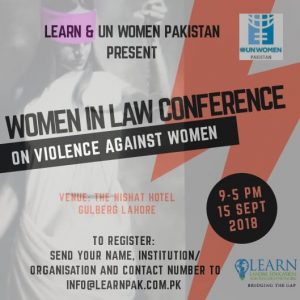
To Apply:
Send your name, institution/organisation and contact number to info@learnpak.com.pk
Why you should attend?
Violence against women has to be understood in the backdrop of socio-economic and institutional factors prevalent in our society to address it effectively.
This multidisciplinary approach is what has been missing from the discourse in the legal fraternity and it is time that lawyers in general and women and women in law are given the chance to look at this issue in its broader context. By teaming up with UN Women Pakistan and some of the most distinguished development sector researchers and lawyers, this conference aims to bring depth to the subject.
In addition to that, it raises important questions and highlights the progress made in relation to access to justice for survivors of such violence thereby not only creating awareness, but also focusing on need to handle these cases with the sensitivity that is required to promote access to the justice system. It’s global outreach makes this a truly important platform for having their voices heard.
Who should attend?
Ministers
Government Officials
Diplomats
Observers and Policy Experts
Public and Development Sector professionals
Human Rights Workers
Women Rights Activists
Bar Officials
Women
Survivors
Female Lawyers
Male Lawyers
Members from Academia
Law School Heads
Gender Experts
Law Students
Members of Civil Society
Others who may be interested
Our Campaign against Single Use Plastic featured in PPAF Newsletter July 2018
Nida Usman – The Alliance Ambassador from Pakistan
Ms Nida Usman has been selected as the Ambassador from Pakistan to represent the cause and mission of “Alliance” – an international NGO working to promote equality and diversity in Alternative Dispute Resolution.
Alliance Ambassadors support and promote events for the Alliance and in collaboration with other organisations to advance the message of the Alliance. These events need not be on the topic of equality and diversity and may be on any topic relevant to the dispute resolution community but always showcase talent demonstrating diversity in our community.
https://www.allianceequality.com/ambassadors/
Plastic Consumption Awareness Campaign
LEARN has launched the ‘Plastic Consumption Awareness Campaign’ to educate and sensitise people about their daily consumption patterns of plastic, the dangers of it and the means to avoid it.
We are using the hashtags:
#KnowYourPlastic
#PlayYourPart
#Refuse to #Reduce
#RefuseTheStraw
To join this initiative please share with us your brief video messages in support of this campaign and email the same to learnpak@yahoo.com
Press Release: Women in Law Seminar 2018
Press Release: The Lahore Education and Research Network (LEARN) held the Women in Law Seminar 2018 in association with Digital Rights Foundation (DRF) on 17th February 2018 at the Nishat Hotel Lahore.
‘Women in Law’ is an initiative of LEARN that was launched in 2016 to highlight and address the challenges and opportunities for female lawyers in Pakistan. Under this initiative the Network held three-part dialogue series in 2016 and followed up their work and research on the same with practical steps to build a stronger community of female lawyers, to connect and open channels of communication amongst them.
The seminar was jointly dedicated to the exemplary contribution of Late Ms. Asma Jahangir to justice, rights and cause of women with a heartfelt tribute by Ms. Nighat dad (Founder DRF) and Ms. Nida Usman (Founder LEARN).
Thereafter, Ms. Nida Usman provided a round-up on the work done so far on this front and the opportunity was taken to launch the first ever magazine dedicated to showcase the work and achievements of female lawyers in Pakistan – The Pakistan’s Women in Law magazine.
In connecting female lawyers across Pakistan, Ms. Nida stressed the importance of harnessing the marvels of modern technology as they themselves use technological platforms and social media to connect and provide a much-needed space to female lawyers for networking that was traditionally not accessible to them.
The Seminar then commenced the panel discussion on Women, Technology and Law to promote an understanding of digital rights and the role of women in utilizing technology for their work and networking and also how they could use it for advocacy of digital rights to reach the most vulnerable of all victims.
The panel comprised of the following speakers:
1. Ms. Shmyla Khan, Project Manager – Cyber Harassment Helpline, Digital Rights Foundation
2. Ms. Anooshay Shaigan – Vice President, Courting the Law
3. Ms. Angbeen Mirza – Advocate and Board Member, Digital Rights Foundation
The session was moderated by Ms. Nida Usman Chaudhary.
The panelists spoke about how the digital rights should be pursued and approached and how we should see them as an extension of the existing fundamental rights. They explained how digital rights do not exist in a vacuum and operate within the framework of the penal laws of the State. Having said so, they also identified the weaknesses of the criminal justice system in this regard and the work that needed to be done to make the reporting of cyber-crimes most user-friendly particularly for women who fall prey to most heinous of online abuse such as revenge porn.
The seminar concluded with a short workshop on achieving online security delivered by Mr. Hamza Ali and Ms. Nighat Dad of DRF. The participants were briefed on the fundamentals of online security, passwords and social applications that ensured data security.
The participants were then given a chance for an open floor discussion on women in law and digital rights and a chance to network with each other more informally over lunch.
100+ WhatsApp Members
Women in Law is an initiative by LEARN to Connect, Celebrate and Support Female Lawyers


